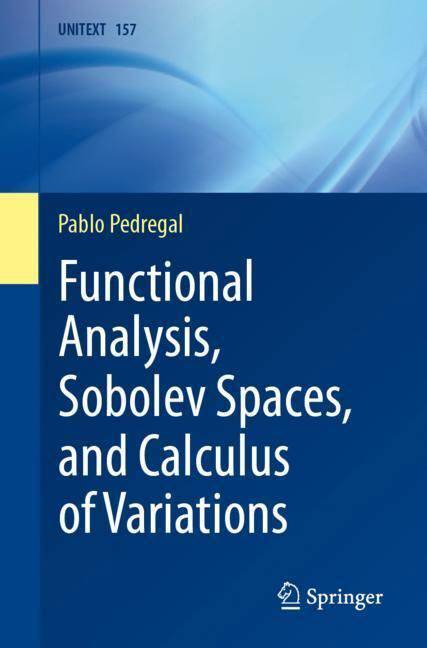
- Retrait gratuit dans votre magasin Club
- 7.000.000 titres dans notre catalogue
- Payer en toute sécurité
- Toujours un magasin près de chez vous
- Retrait gratuit dans votre magasin Club
- 7.000.0000 titres dans notre catalogue
- Payer en toute sécurité
- Toujours un magasin près de chez vous
Description
This book aims at introducing students into the modern analytical foundations to treat problems and situations in the Calculus of Variations solidly and rigorously. Since no background is taken for granted or assumed, as the textbook pretends to be self-contained, areas like basic Functional Analysis and Sobolev spaces are studied to the point that chapters devoted to these topics can be utilized by themselves as an introduction to these important parts of Analysis. The material in this regard has been selected to serve the needs of classical variational problems, leaving broader treatments for more advanced and specialized courses in those areas. It should not be forgotten that problems in the Calculus of Variations historically played a crucial role in pushing Functional Analysis as a discipline on its own right. The style is intentionally didactic. After a first general chapter to place optimization problems in infinite-dimensional spaces in perspective, the first part of the book focuses on the initial important concepts in Functional Analysis and introduces Sobolev spaces in dimension one as a preliminary, simpler case (much in the same way as in the successful book of H. Brezis). Once the analytical framework is covered, one-dimensional variational problems are examined in detail including numerous examples and exercises. The second part dwells, again as a first-round, on another important chapter of Functional Analysis that students should be exposed to, and that eventually will find some applications in subsequent chapters. The first chapter of this part examines continuous operators and the important principles associated with mappings between functional spaces; and another one focuses on compact operators and their fundamental and remarkable properties for Analysis. Finally, the third part advances to multi-dimensional Sobolev spaces and the corresponding problems in the Calculus of Variations. In this setting, problems become much more involved and, for this same reason, much more interesting and appealing. In particular, the final chapter dives into a number of advanced topics, some of which reflect a personal taste. Other possibilities stressing other kinds of problems are possible. In summary, the text pretends to help students with their first exposure to the modern calculus of variations and the analytical foundation associated with it. In particular, it covers an extended introduction to basic functional analysis and to Sobolev spaces. The tone of the text and the set of proposed exercises will facilitate progressive understanding until the need for further challenges beyond the topics addressed here will push students to more advanced horizons.
Spécifications
Parties prenantes
- Auteur(s) :
- Editeur:
Contenu
- Nombre de pages :
- 387
- Langue:
- Anglais
- Collection :
- Tome:
- n° 157
Caractéristiques
- EAN:
- 9783031492457
- Date de parution :
- 31-01-24
- Format:
- Livre broché
- Format numérique:
- Trade paperback (VS)
- Dimensions :
- 154 mm x 234 mm
- Poids :
- 725 g

Les avis
Nous publions uniquement les avis qui respectent les conditions requises. Consultez nos conditions pour les avis.






